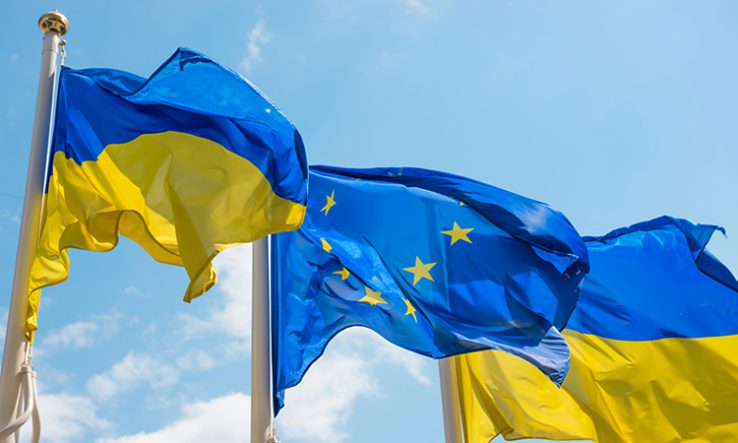
Academics now working abroad praise access to safe environments, resources and new opportunities
A year since Russia escalated its war against Ukraine with a full-scale invasion, Ukrainian researchers have expressed thanks for the support they have received from colleagues and institutions around Europe, which they say has allowed them to live and work safely, as well as expand their professional networks and knowledge.
“I am so grateful for the opportunity to carry on with my research,” says Stefaniia Demchuk, who was working as an assistant professor in the Department of Art History at Taras Shevchenko National University of Kyiv a year ago, before being forced to flee with her son. She is now working as a research fellow at Masaryk University in the Czech Republic, which she has been using as a base to communicate about her work.
“Being there, in safety, made me wonder how should I both thank my host university and be useful to my country in my own, academic way,” she says. “I can say that working as hard as I can is the best way to deal emotionally and intellectually with all the challenges the war [has] brought to us.”
These were sentiments echoed by many of those who shared their accounts with Research Professional News, some of which have been published in more complete form.
Viktoriya Kulyk, a professor of economics who was based in Ukraine and also moved to the Czech Republic with her daughter, where she now works at the University of South Bohemia, says she is “very grateful to my colleagues at [the] university for their support. During this difficult time for me, I was able to be with my daughter in safety and continue working in my profession.”
Many of the displaced researchers welcomed the ability to access resources for their work, opportunities to build up collaborations and knowledge in a new environment, or simply to live in safety.
A secure environment
“There’s no place in Ukraine to hide from this aggression,” says Olha Pyroh, a professor of economics who was based at Lviv Polytechnic National University and is now carrying out research comparing the economies of Ukraine and Canada at L’Université de Sherbrooke in the latter country. “All territory of Ukraine is being bombed and shelled every single day.”
Olga Barvinok, a historian who was based at Uman University and is now at the German Historical Institute in Warsaw, says the welcome many Ukrainian researchers have received from abroad has been a huge help.
“We all found ourselves away from home with our children but the understanding of the situation by the host party, their sincere desire to help, has caused us to overcome many emotional, domestic, professional difficulties,” she says, while describing the support she herself has received as “invaluable”.
Olena Puhachova, a sociologist who fled Ukraine and is now working at the University of Romania, says she was “provided with all conditions for comfortable living, research and teaching activities” in her new base.
New networks
One thing many Ukrainian researchers are grateful for is the ability to build new networks. For Barvinok, who left Ukraine with her 15-year-old son, there are “opportunities to work in archives, as well as establish contacts between scientists, exchange experience [and] opinions, and form new research prospects”.
Kulyk also says she has benefited from new ties, as “The experience of working with Czech colleagues [has] enriched me as a professional and as a person.”
A day before the anniversary of the escalation, the EU announced support for 124 more Ukrainian researchers through its dedicated MSCA4Ukraine scheme. The European Commission said 111 postdoctoral researchers and 13 doctoral candidates would be supported to continue their work in 21 countries, with many moving to Germany, the Czech Republic, France, Spain and Belgium.
“The scheme will allow organisations to host these researchers for a period [of] between eight months and two years,” it said. “When conditions permit, the scheme will also enable selected researchers to re-establish themselves in Ukraine to help rebuild and safeguard the country’s research and innovation capacity.
“Available support will allow them to maintain links with their research and innovation communities, carry out research placements and develop new projects.”
Marking the anniversary of the escalation, the European Council of EU national leaders issued a joint statement pledging to continue supporting Ukraine “in political, economic, humanitarian, financial and military terms”. They said: “All Ukrainians deserve to live in peace and choose freely their own destiny.”
